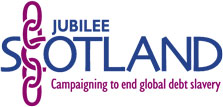 |
||
GORDON BROWN FACES UP TO
WORLD DEBT

Debt campaigners from Lochgelly in Gordon Brown's constituency
met with the Chancellor to hand over photos of supporters that they had
collected as part of Jubilee Scotland's national 'Face up to World Debt'
photo petition.
It was good timing. The weekend before Brown had
been at the Finance Ministers Meeting in Washington putting forward his
plan to provide more money for debt relief and to extend debt relief to
war torn countries. It seems that debt will be high on the agenda at this
year's G8 Summit meeting next week. We had 15 minutes with the Chancellor
who responded to questions that the group had sent him in advance.
Question1
What is the time frame for canceling multilateral debt for the world's
poorest countries?
This is being dealt with at the moment. Bilateral debt has largely been
cancelled.
$70 million has been earmarked for cancellation
the remaining $30 million, of the $100 million promised, is owed mainly
by countries in conflict.
The HIPC Clause will be extended by the end of the
year to include other countries such as Sudan etc. Sudan is currently
in conflict but it is also very poor.
Most multilateral debt is owed to the World Bank
trust fund. In the future most outstanding debt will be multilateral
Question 2
How will debt feature on the G8 agenda for 2005?
The International Finance Facility (IFF) is only one means of financing
debt relief. We need to provide more money for debt relief. We must ask
ourselves how we can move forward on writing off debt. Most debt is now
owed to the development banks and multilateral institutions.
Question 3
Do you agree that debt relief needs to be free of damaging conditions
that risk undoing the benefits? (especially unilateral trade liberalisation)
There are 2 issues here.
One is that it must be a condition that money freed
by debt relief must be spent on anti-poverty measures such as health and
education
Then there is the question of trade conditions.
Around $300 billion is spent on agricultural subsidies and the world only
gives $50 billion in aid. We've got to change agricultural protectionism.
Poor countries need to trade with other countries.
We need to ask ourselves what are the
conditions under which poor countries can trade with other countries.
Debt may be high on the agenda at this year's G8
Summit
Asked about debt sustainability.
We are looking at counties' debt sustainability
but it is sometimes difficult to reach a consensus and get other countries
to agree.
Writing in the Independent newspaper this week Brown states:
Just as with Live Aid in 1985, millions
of campaigners for debt relief in 2000 demonstrated their belief in something
bigger than themselves and showed that they felt, however distantly, the
pain of others.
They not only deserved our praise and respect but demanded a response.
By propelling governments into debt relief they showed that people are
not powerless, but - acting together - can change the world.
So, too, next year can mark a new beginning: a worldwide campaign for
justice on a global scale, a sea change in the way rich countries address
the needs of the poor and an affirmation that, even amidst the tensions
of globalisation, we are - as we should always have been - not a world
permanently divided but one moral universe: today's rich and poor ready
to act as one, recognising our shared needs, mutual interests and linked
destinies.
It is vital to keep up our dialogue with
the government. After a long period of quiet it seems to be all go on
the debt front. Brown has said that when the UK hosts the G8 Summit in
Scotland in 2005 it will be our chance to push for a fairer deal for the
world's poorest countries. We'll be with him all the way.
June 2004
| News |
| Past Events |
| Call for Change |
| Comment & Analysis |
| Debt Links |
| © 2004 Jubilee Scotland | |